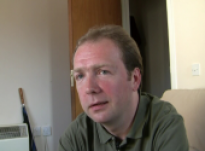Colin - Interview 26

Colin was 19 when he started getting 'strange thoughts' and 'slight paranoia'. Since then he has had a handful of admissions to hospital, and has had varied experience of medication. He is now living in a flat, doing creative writing and is looking at doing some courses.
Colin is currently unemployed, living in a flat, is single with no children. Ethnic Background: White Scottish.
More about me...
Colin has had general counselling in a homeless hostel and found it ok, but it didn’t stop him going ‘full-blown’. At the hostel they had an ‘adult conversation’ about his drinking he ‘never got much benefit’. He would like to get a job that wouldn’t mean he was on less money than his benefits, but finds it difficult explaining the gaps on his CV. He feels a bit ‘jaded’ by his experience of psychiatric services, but will try cognitive behavioural therapy.
Colin had a pseudo-religious experience in which he thought he was 'bigger than world power structures', and another time he felt he knew the meaning of 'time itself'.
Colin had a pseudo-religious experience in which he thought he was 'bigger than world power structures', and another time he felt he knew the meaning of 'time itself'.
Colin didn't want to get involved with service user groups and found it hard to concentrate.
Colin didn't want to get involved with service user groups and found it hard to concentrate.
Colin was short of a couple of tablets one weekend and found that he was getting 'elevated'.
Colin was short of a couple of tablets one weekend and found that he was getting 'elevated'.
Eventually if I do decide to come off this quetiapine , which I take at night, because if I don’t take it, which I did last weekend, not there, but the weekend before that, I’ve been too late to get my repeat prescription and I was short of a couple. The first night I think, I think I got really pissed and then managed to sleep, but the day before I was do to get a new prescription I took I didn’t sleep all night. I got up in the morning and I was like pretty elevated. It was ney just…but it was obviously caused by the.. but it triggered something like and I was getting the vibe again like, where this is going vibe and I thought right, because it was weird because it was after, it was after your day, you know, I’d arranged this meeting and I was so… this is a good one, this will be a refresher like, a little bit, but it was interesting because it is, it’s almost like it knocks out all of the, you know, things that you worry about and stuff, it just goes [whistles] so its like you’re wiped the slate clean, but I don’t know it wasn’t that much, otherwise … I’d managed to read the whole of the Guardian in about three hours.

